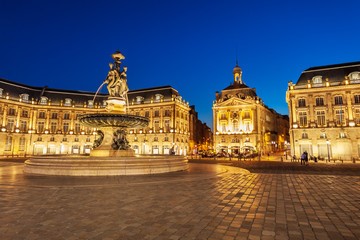Bordeaux. The City of Wine. UNESCO World Heritage Site. Capital of New Aquitaine. Stunningly beautiful and definitely high on my list of retirement destinations for Americans.
While mostly known for the nearby wineries and vineyards of Médoc and Saint Emilion, Bordeaux is an excellent choice for retirement. The city enjoys milder South of France weather and has a temperate oceanic climate, is easily accessible by rail from Paris, is less than 40 miles from the Atlantic, and has a reasonable cost of living. Bordeaux has been going through a decades-long restoration and the scenery, from the 18th and 19th century buildings to the palace gates to the waterfront, is beyond breathtaking.
A (Very) Brief History. Almost 2,000 years old, Bordeaux was originally a fortress as it was settled, conquered, and reconquered throughout the centuries by the Celts, Romans, Franks, English, and French. The various breaks in the city walls are remnants of the original gates that protected the Bordelaise and attest to the invaluable protection that they offered. Today they provide spectacular scenic backdrops from which visitors and residents, and in some places cars, can easily pass through. Bordeaux was officially annexed to France in 1653.
The Old City. On my last trip to Bordeaux, I stayed in the Old City and I can tell you that this is where you want to be. While the city itself is large (Bordeaux is the 5th most populous city in France), the truly interesting parts of it are located in or close to the Old City. For retirement purposes, this may or may not be where you want to be but it is definitely where everything happens. In fact, just about anything of interest in Bordeaux is located in the Old City except, of course, for the wineries and vineyards themselves.
8,000 Wineries. Actually, more than 8,000 wineries. It’s almost impossible to comprehend how many that actually is until you drive for hours and see nothing but unending vineyards. I thought that there might be 8,000 wineries in all of France – but, no, that’s just Bordeaux. So, if you like a deeply profound and luscious glass of red, then this is definitely a top retirement choice for you. And no worries, there’s a fine wine to be found in every price range and I’m sure you’ll enjoy the time it takes you to discover yours.
Walkability. Bordeaux is eminently walkable although cobblestone is everywhere – remember the city dates back eons.
Public Transportation. This is definitely a major plus for the city. You can get around very easily on the 4 tram lines, 75 bus routes, and there are over 400 taxis in town. Of course, the Gare de Bordeaux Saint-Jean train station is a major TGV stop and the airport is just 5 miles away. The city is very friendly toward motorized scooters and cyclists. Bordeaux is also a major motorway hub and has 5 bridges that cross the Garonne River.
Things to Do. In addition to a plethora of wine shops, Bordeaux has hundreds of restaurants and is known for its gastronomy, cafés, patisseries, boulangeries, cultural events, and the list goes on and on. It is hard for me to imagine anyone running out of things to do. And if you like sports, Bordeaux has its own professional soccer team, the FC Girondins de Bordeaux. The Girondins, or more simply Bordeaux, play in Ligue 1, the top division of French football.
Top 10 Tourist Stops. When your friends and family come to visit, make sure to take them to:
- Place des Quinconces
- The Grand Théâtre
- Place de la Bourse
- Saint Andrew’s Cathedral
- Tour Pey-Berland
- The Stone Bridge
- The Waterfront
- Porte Cailhau
- Monument aux Girodins
- La Grosse Cloche
And, of course, to the two great wine-producing regions:
- Médoc (northwest of Bordeaux)
- Saint Emilion (east of Bordeaux)
English. Do the Bordelaise speak English? Hmmm, not so much as you find in Paris so learning some French would be beneficial. That’s not to say that they don’t speak English – they definitely do – but as you move away from the tourist areas, you’ll find the number of falls off pretty fast.
Cost of Living. The cost of living in Bordeaux fluctuates with where you want to live and how active you’ll be but, generally speaking, it’s slightly higher than the rest of France. Of course, this is to be expected as you’re in one of the best wine-producing regions in the world, surrounded by a lively city that offers a very active retirement, and incredible culinary options.
For renters, a two-bedroom apartment runs on average $800-1000/month and can obviously go much higher. A baguette from a local boulangerie is 1€ (a little more than a dollar), a good bottle of wine between 7€-10€ (between $8-$11), and a complete dinner for two for about 50€ (about $55). Throw in utilities, groceries, various activities, and a 10% cushion, and you’re probably looking at $2000-$2200/month.
Bonne chance !

